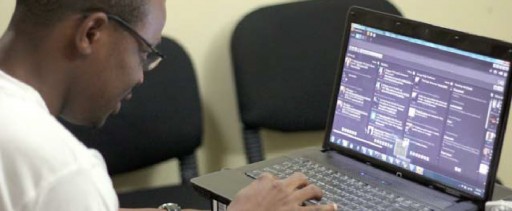Crowdsourcing democracy through social media
October 12, 2011

Tracking social media during elections (credit: Social Media Tracking Centre)
Social media can identify and help prevent dangerous situations from occurring during elections, says Georgia Tech Associate Professor Michael Best.
When nearly 40 million Nigerians took to the polls last April to elect a new president, Best provided technical support for a Nigerian group that wanted to use social media for tracking the election process and identifying any problems that cropped up.
Best and his team of researchers designed a social media aggregator tool that could pull content from about 20 different sources (including Twitter, Facebook, SMS messaging, blogs, and social-media websites) and analyze the data in real time using keywords.
At the peak of activity, the aggregator tracked about 50 reports per second and analyzed them based on keywords and location data. The Nigerian Social Media Tracking Centre (SMTC), formed just before the election by the organization Best was supporting, forwarded confirmable reports of election irregularities — and ultimately, reports of violence — to Nigerian authorities.
The aggregator collected about 750,000 reports containing pre-identified keywords. Following the election, the SMTC issued a summary report that listed recommendations for using social media and instant messaging to improve future election experiences, such as:
- Training civilian groups and voters to tweet election results
- Organizing SMS group accounts for both national and local election officials
- Establishing a central database to collate election results, and having local precincts send results via SMS
- Advising international monitoring organizations to partner with domestic groups that will monitor social media
- Using social media in real time to help improve the electoral process itself, acknowledging that civilian reports can provide critical information. If violence erupts, the hours or even minutes saved by having identified the situation through social media posts could make a significant difference in response.
Best and team want to produce open-source software to monitor major events to complement traditional monitoring techniques. For example, the National Democratic Institute and the European Union both sent observers to Nigeria for its April elections, and today Liberia will likewise see international teams on the ground, monitoring and reporting on the country’s electoral processes.
As reports begin to filter in, the aggregator will use posts clustering around certain keywords as evidence in a real-time catalog of “curated incidents.” If the team identifies a situation it decides should be reported to Liberian authorities, Best has partnered with iLab Liberia, an information technology support organization, which will staff a “response room” in the country.
In 2012, Best hopes to employ the aggregator in monitoring elections in Kenya, Senegal, and the new nation of South Sudan.